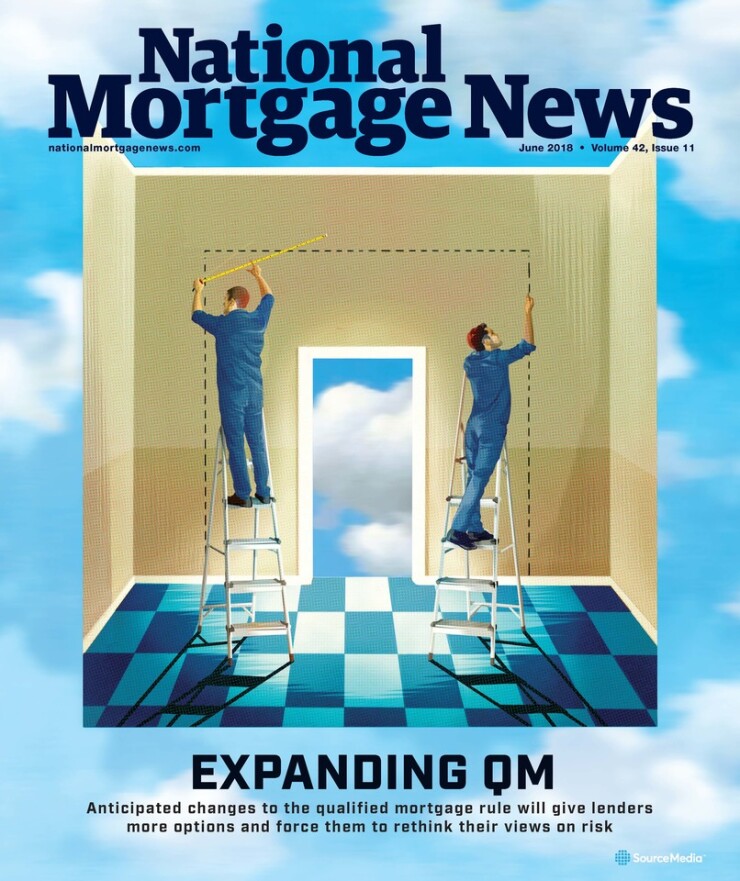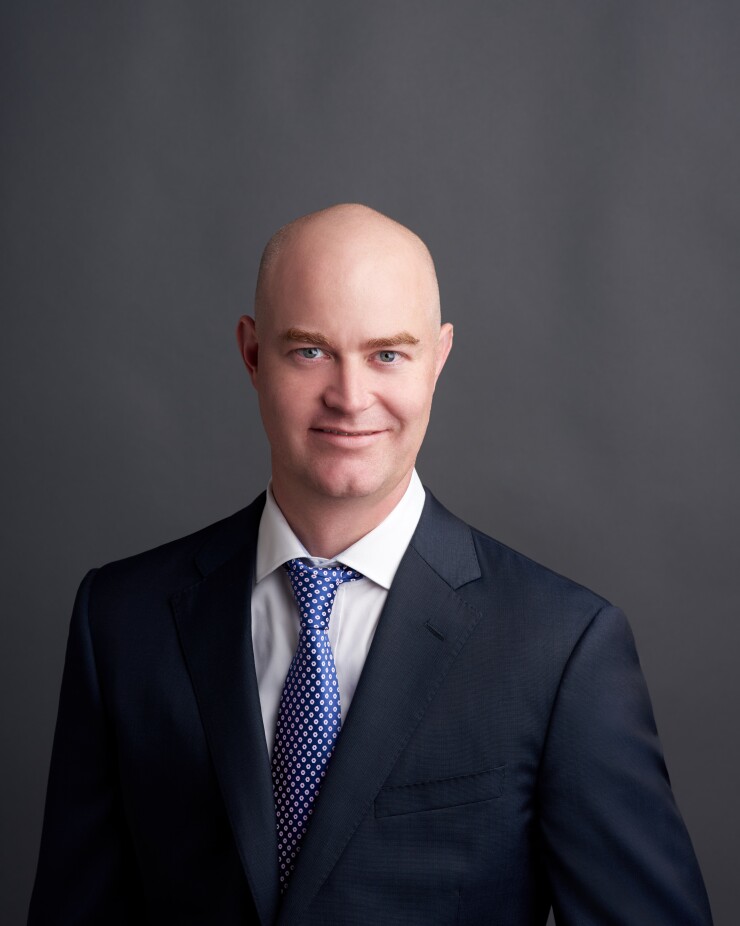
Editor's Note: This is part two of a two-part series on the future of the qualified mortgage rule from the June issue of National Mortgage News magazine.
Since its inception, the qualified mortgage rule has been synonymous with loans purchased by the government-sponsored enterprises or guaranteed by federal agencies like the Federal Housing Administration and Department of Veterans Affairs.
The recent growth in the non-QM market and concurrently, in private-label securitizations, is a result of participants across the loan life cycle becoming more comfortable with the risk characteristics of these loans, especially as interest rates rise.
There are lenders that have or will securitize agency-eligible mortgages in the private-label market now because they can get a better execution. A
The current administration would like to pull back the government guarantee on certain types of loans such as cash-out refinancings, high-balance loans, second home mortgages and investor loans, said Peter Norden, CEO of HomeBridge Financial Services. The Trump administration would prefer the private sector own the paper and take the risk, rather than the government giving an implied or explicit guarantee, he added.
It is one of the reasons HomeBridge is working on a deal where it would securitize otherwise agency-eligible paper in the private market.

HomeBridge wouldn't be the first. Some recent private-label deals that included agency-eligible paper were from loanDepot, which did
"The private-label execution on some QM loans that qualify for the agencies that have a lot of loan-level adjusters can be as good as or better than the agencies," Norden said.
Nor does he see an expanded definition of the QM rule as a zero-sum game. In a changed environment, both the non-QM and expanded definition QM private-label markets can thrive.
"The paper that is eligible for the agencies will in fact be cut back and become part of the private-label securitization market going forward," Norden said. "And whether or not they change the definition of QM on those loans or not remains to be seen."
What he is wary of, though, is the potential size of the market for private-label securitizations of lower-credit-quality mortgages.
"I, for one, have no desire to go back to where we were prior to 2007 from
There are people who have lower credit scores but also have the income to make the payments and they should be able to get a loan. But those loans should not be combined with a high loan-to-value ratio.
"I am hoping we have some amount of common sense in this business going forward and that we really are driven towards helping the consumer in any way we possibly can as well as helping our overall mortgage-banking community," Norden said.

Carrington Mortgage Services started concentrating on originating mortgages to borrowers with credit scores under 640 about four years ago, serving them through government-guaranteed loan programs. It has now rolled out
"It's going to turn out differently because we learned something from the last decade. We're going to make sure our borrowers understand what they're getting themselves into," said Carrington President Ray Brousseau.
The default risk falls on Carrington because it will retain these loans through affiliates and service them in-house. It has a long-term incentive to ensure these loans continue to perform.
When it went into the government space, it introduced a proprietary credit learning program called My Loan Detail. Borrowers go through answering a series of questions about the loan transaction, the terms of the loan, their income and even the consequences if they don't make payments.
Any changes to QM should not impact the Carrington program, added Carrington Executive Vice President Rick Sharga. "It depends on what aspects of the QM rules are relaxed, and I can't imagine they'd be relaxed so significantly that we'd see a significant impact on the volume of loans in the non-QM space.
"There is nothing in the QM rules or in the ability-to-repay guidelines that says a low FICO score borrower can't get a loan. There is no FICO minimum for a QM loan. The problem is that most lenders, particularly the depository banks, decided not to participate with those borrowers," he said.
If the CFPB widened the QM tent, it would theoretically be a net benefit to lenders like Carrington, said Sharga. But on other hand, it also might increase the number of lenders that participate in the lower-credit-score space and make it more difficult to maintain market share.
"There's still a comfort level that whatever the expansion in the credit spectrum and in the requirement spectrum by the CFPB is, good loans can still get made," said John Vella, chief revenue officer of Altisource Portfolio Solutions. "Because let's face it, the CFPB is probably seeing it too."
And that is a positive for the entire nonagency spectrum. "With more volume, there's more incentive for the secondary market and there's more financial upside for all the players in the entire spectrum," Vella said, explaining that increased volume offsets costs and brings in revenue for everyone involved in the transaction.
Verus Mortgage Capital is a correspondent aggregator of whole loans affiliated with investment management firm Invictus Capital Partners. Its market is "expanded nonagency," including jumbo loans, self-employed bank statement borrowers, single-family rental and fix-and-flip loans, said Dane Smith, president of the Washington, D.C.-based firm.
It has 145 approved clients with 72 active sellers. Verus purchased about $2 billion in closed loans, both QM and non-QM, since the company started in business and it did $400 million in acquisitions in the first quarter of this year.
"The QM designation doesn't have a huge impact … We're looking for well-underwritten borrowers with attractive credit risk profiles," said Smith.
Securitization is the way that many lenders get term financing on a non-QM loan because of the risk retention requirements.
"People used to think of securitization as a risk transfer; it's no longer a risk transfer, it's a financing," Smith said. "There's significant skin in the game; the non-QM issuers have significant skin in the game today."
There is a secondary market developing because "liquidity begets more liquidity. As more buyers enter the market, the more comfortable originators become originating," he said.
"It's going to turn out differently because we learned something from the last decade. We're going to make sure our borrowers understand what they're getting themselves into."
— Ray Brousseau, president of Carrington Mortgage Services
Yet the non-QM business is at a crossroads. In 2017, the non-QM borrower was someone who applied for a loan and was surprised if an application was denied, Smith said. Now, it's starting to consist of people who are discovering they have access to credit after all of the negative news of the past few years.
"We're moving into a period where people will start actively sourcing and generating leads around this space. We're starting to see that with our customers," Smith said. This shift will continue through this year and into next. "It's takes a while for this industry to move forward."
If the QM rules are changed on the margins, conforming lenders could open their underwriting box. But none of the proposed changes raised in the comment process impact Verus' business. If the GSE patch ended, it "actually creates more opportunity for us," Smith said, as fewer loans would be sold to Fannie Mae and Freddie Mac.
"ATR is really





